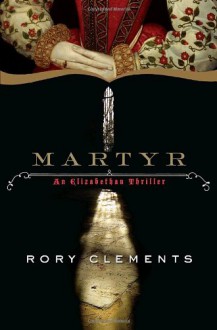
Martyr is a really good, well worked, evocative and thoroughly convincing journey back to the late 16th Century Elizabethan England and the time of Shakespeare. John Shakespeare, actually. Will’s older brother. John isn’t an actor or playwright, he’s a detective. Though this is of course set before there was a Police force, he is more of a private detective, working for the Lord Walsingham trying to keep England, and in particular Good Queen Bess, safe from the threat - real and imagined - from Philip the King of Spain, his armada, Catholics in general, the Inquisition and traitors of an assorted, generally foreign, nature.
In the aftermath of the execution of Mary, Queen of Scots, Shakespeare starts investigating the really rather grisly murder of a young women, who may or may not have been mixed up in intrigues she probably shouldn’t have been mixed up in. Shakespeare is on legitimate Royal business, but even so it’s not all plain sailing. Shakespeare has unwanted competition in his investigation. Everywhere his investigation takes him, he seems to be one step behind the unscrupulous and ruthless Richard Topcliffe. A man with his own private rack down in the family torture chamber is to be avoided at all costs, especially but not necessarily, if you’re a Catholic. Topcliffe has his own agenda and has dressed up petty ruthless revenge in ‘I’m doing the Queen’s business more than you are', Royal finery.
England has been and is whipped up into a frenzy of Catholic-hating and traitors, real or imagined, are around every corner, under every bed, in every house or country pile, either murdering people in most foul ways or hiding for days in their stinking priest holes. And there is a plot to murder England’s potential hero of the hour, Sir Francis Drake. The thought, unspoken but felt by all is, that if he dies, England will be open to Spanish - and even worse, Catholic - invasion.
Clements does a really good job of evoking the mood and the tension of the period. As well as conveying the all suspicion and noble ends to justify really rather unpleasant means. And while on the subject of unpleasant - we get shown around the stinking streets of London, into the veritable hell-holes and corrupt pits that were Elizabethan prisons, and a tour across the south of England down to Plymouth in a desperate race against time to rescue Sir Francis Drake. Mostly to rescue him from himself, it has to be said. As a character, John Shakespeare is perhaps a little too idealistic, even naive for his time. Which makes him a thoroughly likeable character for our time, even if like-ability was necessary - he is brother to William for goodness’ sake! Worth reading about for that alone (I know he’s made it up, btw).
If you wanted to look outside the confines of the book and see where the themes are today. It is in the suspicion of people’s with a different culture to ours’, who do things differently and also have the temerity to think they’re right, have God on their side and we’re wrong. You can see it in your newses every day, can’t you? Even 'Catch 22', sometimes - as in the thoughts of how far is it needed to go to show your loyalty. If loyalty is behind the means, does it excuse the means? Can you be more loyal because you are prepared to be more ruthless? Does hesitancy through decency and humanity, show weakness? Fortunately - for those locked up these days, the prison system is a little better, certainly cleaner, and your well-being while inside doesn’t depend (entirely) on how much money you can pay the gaoler to keep the other prisoners off your back and your hands out of the thumbscrews.
I didn’t know at the time of reading, but Martyr is apparently the first in Clements’ series of novels about his fictional detective and brother to William, John Shakespeare. And this bodes very well for the series. I’ll be reading them.

 Log in with Facebook
Log in with Facebook 





